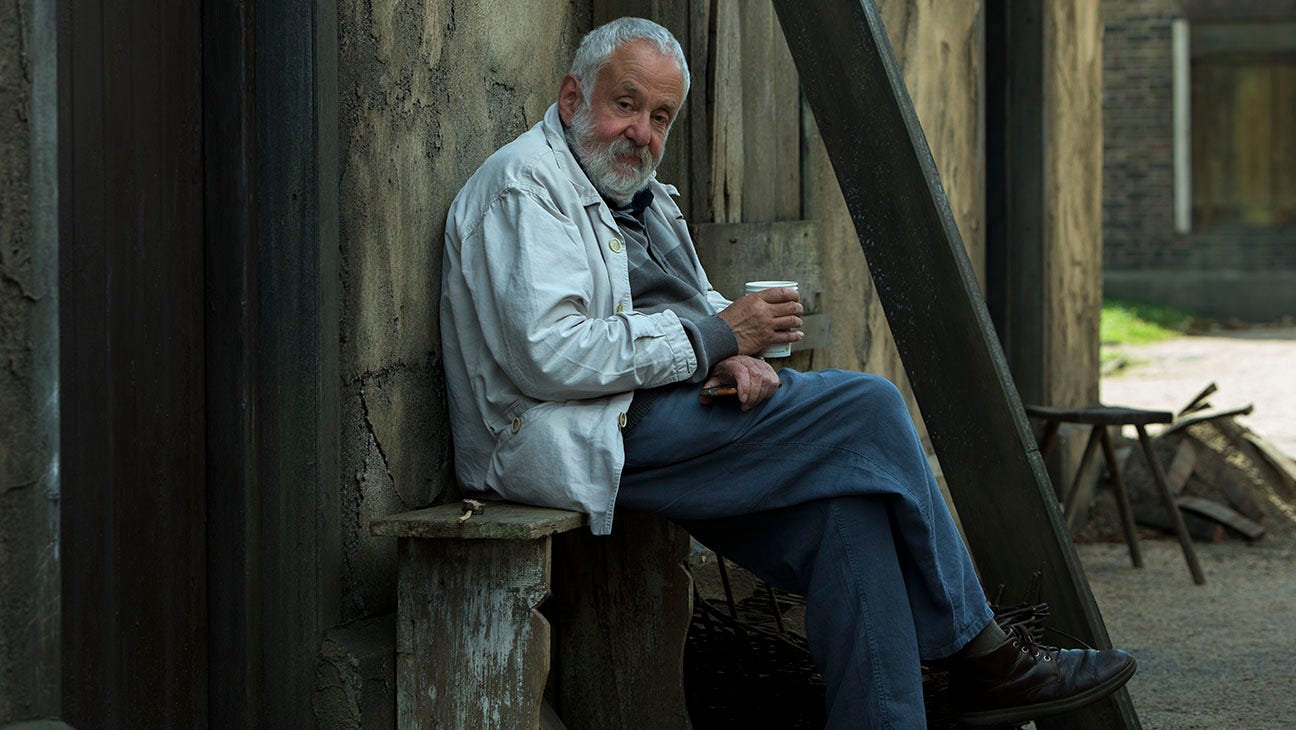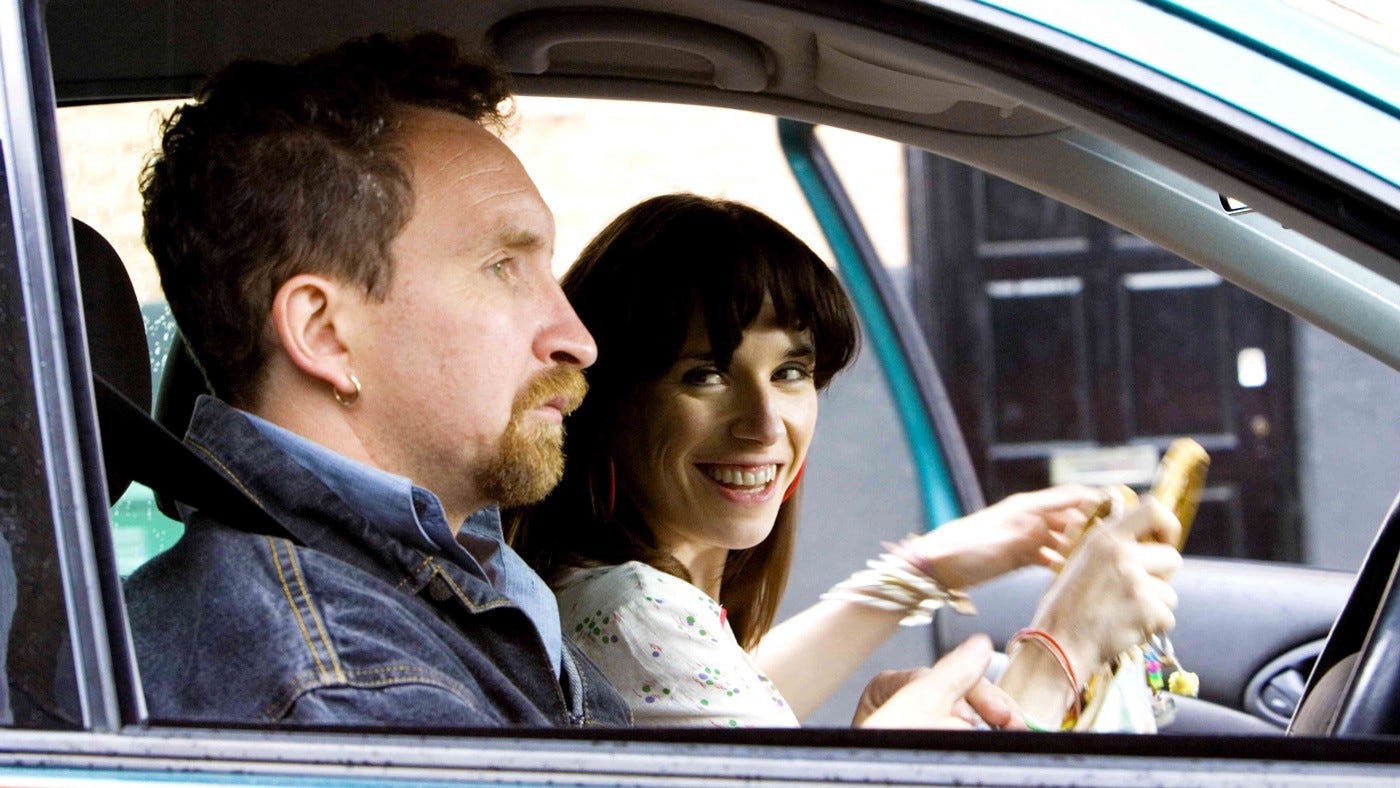Misery Loves Company: Mike Leigh's Unhappiest Characters (Ranked)
Scanning the sour faces of a British master's fascinating career
Receive all future Afterglow newsletters electronically by clicking the subscribe button. This is a free and public post so please forward. Thank you!

Mike Leigh’s portraits of working-class despair ring true because they understand unhappiness doesn’t happen overnight. It takes a lot of time, compromise, and repressed emotions to become this bloody miserable. For his many gloomy characters, the hallmark British institutions (government, family, marriage, royalty) which are supposed to offer support and structure have only deepened their capacity for resentment. This internalized rage often comes to a rolling boil over afternoon tea.
In honor of The Criterion Channel currently offering 11 Mike Leigh films for streaming, I thought it might be fun to rank the unhappiest of his fictional flock taking into account their demeanor, anxieties, verbal warfare skills, and overall potential for changing their negative outlook on life. Some of these characters are central to the narrative of their respective films, while others reside on the periphery. Nevertheless, these are the people who most thoroughly embody the complicated cocktail of despondency Leigh continues to depict with such seamless force.
Note: I’m sure there are some worthy candidates I’ve left out, so my apologies in advance for missing your favorite Mike Leigh misanthrope.

10) Hannah (Katrin Cartlidge), Career Girls: One of Leigh’s most underrated efforts, this breezy yet nervy reunion drama jumps between past and present as two old friends from college reconnect after years apart. Hannah is the film’s cagey wildcard, a brash university student who specializes in confrontational soliloquies and issuing literary challenges. She’s very aware of her outwardly hostile demeanor (“Sometimes I get the devil in me”), and in the film’s present-day scenes Hannah has somewhat been able to repress those feelings enough to become a business professional. But her core frustrations with men and societal contradiction remain, and unlike some of Leigh’s other angry young characters, she expresses how this internal struggle has taken quite the toll - “When I look at men all I see is a dangerous weakness. I don’t want it to be that way. But I just can’t help it. Makes me feel lonely.”
9) Stuart (Ron Cook), Secrets & Lies - This truly selfish, resentful, and pathetic man only pops up in one scene of Leigh’s powerful character study, but damn if it’s a doozy. Stuart is the previous owner of Maurice’s (Timothy Spall) now flourishing photography business and is by no means thrilled about sulking back after spending years abroad. Throughout one deeply uncomfortable and one-sided conversation, Leigh gives us their entire backstory, which somehow feels like a rivalry of one. After being rude and critiquing all of the changes Maurice has made to the shop’s interior, Stuart has the gall to ask for a job before drunkenly exiting disgracefully. Truly a miserable legend.

8) Phil (Timothy Spall), All or Nothing - Here’s a great example of a classic Leigh archetype - the silent sufferer. Usually, these characters are married or shacked up with an outwardly abusive partner, but in Leigh’s bruising 2002 film good old Phil, a quiet cabbie thoroughly pummeled by life, is married to an equally dejected and voiceless mate (Lesley Manville’s Penny). Throughout the film, Phil makes hardly a peep, only muttering responses when absolutely necessary. During the most critical moment when his family needs him most, he’s taken a pity party drive to the coast with his phone turned off. Not really a bad guy, Phil has just given up on life in the most cowardly way possible…without a sound. It also doesn’t help that he consistently fails to stick up for Penny when their enraged son Rory (a very young James Corden) vocalizes thunder and lightening at the dinner table.
7) Sarah (Ruth Sheen), Mr. Turner: Nobody gets under the skin of grumbling, grunting great artist J.W.M. Turner (Timothy Spall) like his ex-wife Sarah Danby (played with ferocious control by Leigh stalwart Ruth Sheen). During a perfectly sour scene near the biopic’s beginning, we see just how much damage she can inflict in a small amount of time. When the reclusive painter can take no more abuse, he leaves unceremoniously, prompting Sarah to scream a great final proclamation: “How dare you take your leave of me. You insult me, as you have always insulted me!”

6) Colin (Tim Roth), Meantime: Honestly, I could have included this character’s entire immediate family, all of which are experiencing some stage of extreme anger and emotional tumult while living off the dole in Margaret Thatcher’s economically distraught 1980s England. But it’s the shy, socially awkward Colin who feels the most tragically unhappy since he’s so susceptible to outside influence, and is perpetually caught in the crossfire of his arguing parents. On the one hand, his prickly brother Mark (Phil Daniels) pushes him to be more outgoing and flirtatious with girls, while their mutual friend and skinhead Coxy (an atomic Gary Oldman) provides him with a fundamentally alienating ideology to emulate. Neither one prepares him for the harsh reality of responsibility when he agrees to take a menial contracting job for his sanctimonious aunt (Marion Bailey). By the film’s conclusion, Colin has shaved his head but can’t bring himself to take off the hooded winter coat that hides his symbolic gesture of working-class strife. He’s truly stuck.

5) Nicola (Jane Horrocks), Life is Sweet: This character doesn’t speak so much as she screeches. Looking like a coked-out Juliette Lewis, Nicola goes through Leigh’s hilarious comedy tormented by her worsening bout with Bulimia and an overall disaffection for her family’s seemingly happy equilibrium. She’s broke and spends each night vomiting up a suitcase full of chocolate bars seemingly just waiting for someone to notice. Nicola claims to be political, but wearing t-shirts with leftist slogans makes up the extent of her activism. Leigh could have easily turned this character into a caricature of tragic youth, but he imbues Nicola with so much more depth and heartache than her frazzled facade would initially suggest. The final few scenes she shares with mother Wendy (Alison Steadman) and fraternal twin sister Natalie (Claire Skinner) offer glimpses of a lifeline and are stunningly hopeful for a character on the edge.
4) Valerie (Heather Tobias), High Hopes - There may be no more insecure character in Mike Leigh’s filmography than Valerie. She so badly wants to be a yuppie and disavows all of her duties as sister and daughter in order to put on the mask of capitalist pride. Her cheating car salesman husband might be even worse, but he’s at least honest about being a terrible person. Valerie lies and is entirely unreliable in all respects, but never really cops to it. Instead, she presents herself as generous, a notion every other character finds downright hilarious. After throwing what can only be described as the worst birthday party ever for her elderly mother, she ends the film getting drunk on champagne while sitting in a bubble bath. The future is frothy.

3) Johnny (David Thewlis), Naked - Mike Leigh’s shark, always moving and tearing people apart. He even thrashes around during sex. A committer of petty crimes. A nihilistic orator. Constantly judging others. Rarely stops talking. He’s obviously smart, and his insults are one-act plays. He’s the young philosopher asshole who thinks he knows everything about the world but actually just knows his perception of it. He likes humiliating women and causing havoc just for kicks. When asked if he’d ever seen a dead body, he responds “only my own.” Oh, and he likes to spout conspiracy theories involving the bible and offers apocalyptic visions of mankind’s future. Johnny spends the entirety of Leigh’s wonderful dark comedy looking for someone to listen to his diatribes. In the end, he just keeps on walking, beaten, bruised, and alone.

2) Scott (Eddie Marsan), Happy-Go-Lucky: Considering his penchant for apocalyptic conspiracy theories and convulsive fits of rage, this driving instructor from hell feels like an ideological descendant of David Thewlis’ Johnny. But in man ways, Scott is an even more depressing piece of work. Leigh sets nearly all of the characyer’s scenes inside his small car, a cramped kingdom where the world’s chaos can be ignored by way of an extremist’s take on vehicular rules and regulations (“En-Ra-Ha!”). Scott’s dripping discontent drains the film’s lead Poppy (a never-been-better Sally Hawkins) of her typical optimistic manner. During their initial lessons, she tries to lighten the tense mood with some jokes and friendly banter, but Scott misconstrues it for flirting. His blatant misreadings of social situations and conversations accumulate before busting loose in the film’s climax, a shouting match with Poppy that turns momentarily violent. Instead of calling the police on Scott, she chooses to be empathetic and let him go on being a miserable piece of shit.

1) Mary (Lesley Manville), Another Year: My heart breaks for Mary every time I watch Leigh’s seasonal mosaic about a happy couple (Ruth Sheen and Jim Broadbent) surrounded by their unhappy friends. She is one of the most sorrowful characters in modern cinema, a combination of vanity, ignorance, arrogance, and insecurity perfectly executed by the great Lesley Manville. While Peter Wight’s drunken mope Tim and Imelda Staunton’s walking storm cloud Janet both garnered some serious consideration for this spot, ultimately it was Mary’s mixture of self-involvement, constant skirting of responsibility, and ladder-climbing manipulation tactics that cemented her spot at the top of this list. All of those traits are employed to mask her deep, deep sadness about failed love, career stagnation, and vapid obsession with her own appearance. She tries multiple times to seduce different men in the film, and each leads her further down the road toward disappointment. The film’s final dinner table camera shot ends on her for a reason: the years keep adding up, and the unhappiest people continue to believe their unhappiness is someone else’s fault.
——————————————————————————————————————
Receive all future Afterglow newsletters electronically by clicking the subscribe button. This is a free and public post so please forward. Thank you!
Until next time,
GHJ



